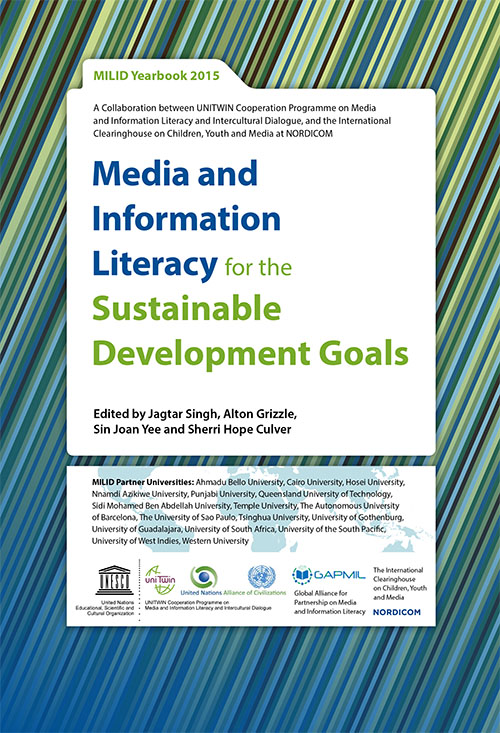Media and Information Literacy for the Sustainable Development Goals
MILID Yearbook 2015
The UNITWIN Cooperation Programme on Media and Information Literacy and Intercultural Dialogue (MILID) is based on an initiative from the United Nations Educational, Scientific and Cultural Organization (UNESCO) and the UN Alliance of Civilizations (UNAoC). The main objectives of the UNITWIN network are to foster collaboration among member universities, to build capacity in each of the countries in order to empower them to advance media and information literacy and intercultural dialogue, and to promote freedom of speech, freedom of information and the free flow of ideas and knowledge. The MILID university network now consists of 17 universities from all regions of the world.
The year 2015 is a pivotal year as it marks the end of the period during which the Millennium Development Goals (MDGs) were to be reached and the year in which new global development targets are to be set.
The MILID Yearbook 2015 provides a case for media and information literacy (MIL) as a tool for open and inclusive sustainable development. It draws on research findings, theories and practices of MIL, and developments focusing on the theme identified for the 2015 MILID Yearbook: Media and Information Literacy for the Sustainable Development Goals.
This third MILID Yearbook is a joint initiative of the UNESCO-UNAOC University Cooperation Programme on Media and Information Literacy and Intercultural Dialogue (MILID) published by Nordicom’s International Clearinghouse on Children, Youth and Media.
Content
Editorial Advisory Board
Foreword
Preface
Introduction
Towards a Global Media and Information Literacy Movement in Support of the Sustainable Development Goals
Sustainable Development through Teaching and Learning
Explore, Engage, EmpowerModel: Integrating Media and Information Literacy (MIL) for Sustainable Development in Communication Education Curriculum
Jose Reuben Q. AlagaranII
The MILID Dividend: A Conceptual Framework for MILID in the Glocal Society
Thomas Röhlinger
From Information Skills for Learning to Media and Information Literacy: A Decade of Transition in South Asia: 2004-2014
Jagtar Singh
Media and Information Literacy Education: Fundamentals for Global Teaching and Learning
Carolyn Wilson, Tessa Jolls
Information and Communication Technologies (ICT) Literacy for Sustainable Development
Anubhuti Yadav
Media and Information Literacy: New Opportunities for New Challenges
Jordi Torrent
From Living Rooms to Classrooms: “Turn on the Lights” of Mobile Learning in MENA
Ibrahim Mostafa Saleh
Media and Information Literacy in Higher Education in India
Harinder Pal Singh Kalra
Information Literacy Initiatives at the Faculty of Philosophy in Sarajevo
Senada Dizdar, Lejla Hajdarpašić
Media Organizations, Information Providers, and Freedom of Expression
Measuring Media and Information Literacy: Implications for the Sustainable Development Goals
Alton Grizzle
Data Literacy: An Emerging Responsibility for Libraries
Tibor Koltay
MIL Policies in Europe 2004-2014: The Uniqueness of a Policy and its Connection to UNESCO
José Manuel Pérez Tornero, Tomás Durán Becerra, Santiago Tejedor Calvo
Information Freedom and GAPMIL in Asia-Pacific Region: Challenges and Suggested Action Plan
Kyoko Murakami
MIL Empowerment for an Enhanced Democracy: An India Perspective
Neelima Mathur
Impact of Social Media on Political Participation of Egyptian Youth
Sally S. Tayie
Media Literacy and Political Campaigns in Nigeria
Adebisi O. Taiwo
WeOwnTV: Survivors Speak Out in Sierra Leone
Kathleen Tyner
Media and Information Literacy in Bangladesh: A Case Study of East West University
Dilara Begum
Linguistic Diversity and Intercultural Dialogue
Measuring Linguistic Diversity in Indian Online Scenario
K S Arul Selvan
Muses on Information Literacy, Media Literacy and Intercultural Dialogue: A Coffee and Tea Shop Application
Forest Woody Horton, Jr.
Media Wise: Empowering Responsible Religious Leadership in the Digital Age
Ogova Ondego
Intercultural Dialogue and the Practice of Making Video Letters between Japanese and Chinese Schools
Jun Sakamoto
Towards a Global Strategy for Media and Information Literacy
José Manuel Pérez Tornero, Santiago Tejedor, Marta Portalés Oliva
Gender Equality and Persons with Disabilities
Communication Strategies for Effective Participation of Women in Healthcare Programmes in Rural Nigeria
Adebola Adewunmi Aderibigbe, Anjuwon Josiah Akinwande
Women’s Life-Skills Education through Local Cultural Arts: Enhanced by Media and Information Literacy
Mia Rachmiati, Syarif Maulana
Information Literacy among People with Disabilities
Manukonda Rabindranath, Sujay Kapil
Towards a Framework of Media and Information Literacy Education for Children with Disabilities: A Global Entitlement
Vedabhyas Kundu
Advancing Knowledge Societies: Environment, Health and Agriculture
Ecomedia Literacy for Environmental Sustainability
Antonio López
Beyond Training the Trainers: Engaging the Grass Roots in China’s Public Health Campaigns
Cornelius B. Pratt, Ying Hu
News Kills: Media Literacy and Health Education
Li Xiguang, Zhao Pu, Ouyang Chunxue
Role of Agricultural Information Literacy in Agricultural Knowledge Mobilization
Inder Vir Malhan
Contributors

